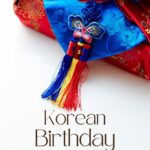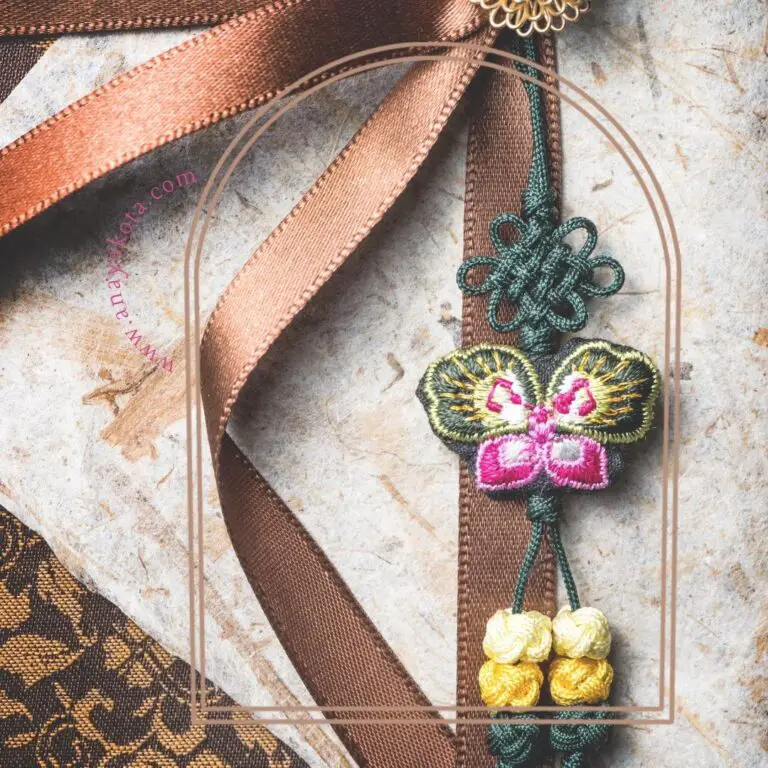This post may contain affiliate links. Please read my disclosure policy for more info.
Learning about Korean birthday traditions means you can wish your Korean friends and family well and celebrate appropriately.
Koreans love celebrating together, sharing food, and friendship, especially on birthdays.
Birthdays are a particular occasion for celebration, with unique customs around food and parties.
While Westerners tend to celebrate the 13th, 18th, and 21st birthdays, Koreans focus on other special dates.
Growing up in America but having strong Korean traditions in the family allowed me to experience not only American cultural celebrations but also Korean milestones too.
Although I cannot remember it physically, I was blessed to have my own 100 day Korean celebration, doljanchi and American style birthday celebrations.
From my first Korean birthday gifts to my 21st birthday celebration (which was in Korea), I learned that Korean birthday traditions are so beautiful, exciting, and symbolic.
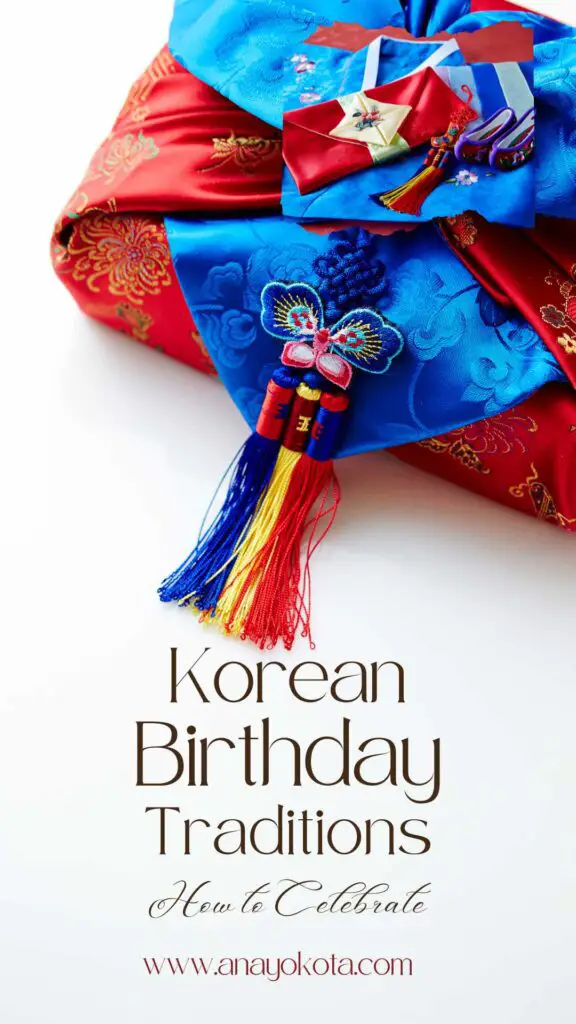
Quick side note: The image above is a very traditional way of wrapping birthday gifts. The fabric that is used is called Pojagi (or bojagi) and has been used for hundreds of years in Korean history that represents art and culture.
How Important Are Birthdays In Korea?
Birthdays are a central part of Korean culture, not only because they are celebrated joyously by friends and family alike.
Age is a deeply rooted concept in Korea and defines relationships between people — especially when it comes to Korean zodiacs.
Why Is Your Age Important In Korea?
In Korea, you’ll often be asked how old you are. This question isn’t idle curiosity: it’s a way of determining how to relate to you.
Respect for your elders and responsibility for those your junior is built into the Korean language.
Korean people will use different language when addressing those younger or older than themselves.
These customs explain why your Korean friends may call you oppa as a sign of respect if you’re older or dongsaeng (little brother or sister) if you’re younger.
People of the same age are automatically chingu or friends.
If someone asks your age or birthday, give it in order of year, month, and day: I was born on 2001 November 3.
How Do Koreans Calculate Your Age?
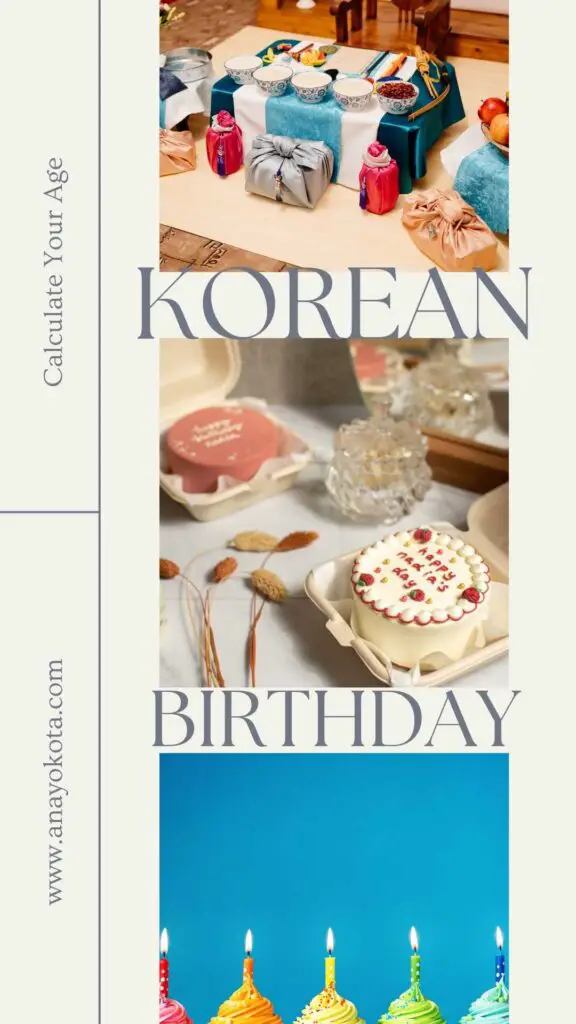
Koreans have unique traditions around calculating age, making the age and birthday issue even more complicated for visitors.
Calculating your age may seem an odd requirement, but if you’ve spent time in Korea, you’ll have realized that age is not counted from your day of birth.
Your friends may seem to be celebrating their birthdays on more than one day, and despite having the same birth year, they may be older than you.
The unique South Korean age system starts counting once a woman is pregnant, so a child is already a year old once they’re born.
Age doesn’t advance on the date of birth each year but at the new year.
So you’ll be a year older in January, even if your birthday is in July.
For example, if a baby was born on 31 December 2022, it would be one year old. On 1 January 2023, it would be two years old – Westerners would say the baby is only one day old.
Here are two ways to calculate your Korean age, so you can answer the next time you’re asked:
1. (Current year – birth year) + 1 = Your Korean age
(2023 – 2001) +1 = 23
2. If you’ve already had your birthday this year: Your age + 1 = Korean age
If you haven’t had a birthday yet this year: Your age + 2 = Korean age
This tradition explains why your Korean friends and family may say they are a year or two older than you, even if you’re the same age.
Up to now, the Korean age has been used for legal purposes, such as the drinking age or the age at which you’re drafted into the military.
However, from 2023, this law has been changed to align South Korea with the rest of the world, so the international or foreign age will be used for official documents and legal and social matters.
Still, Koreans will always have a Korean age and an international or foreign age.
What Are Korean Birthday Traditions?
Koreans love celebrating with food, friends, and family; their birthday traditions give them multiple opportunities.
Korean 100 Day Birthday
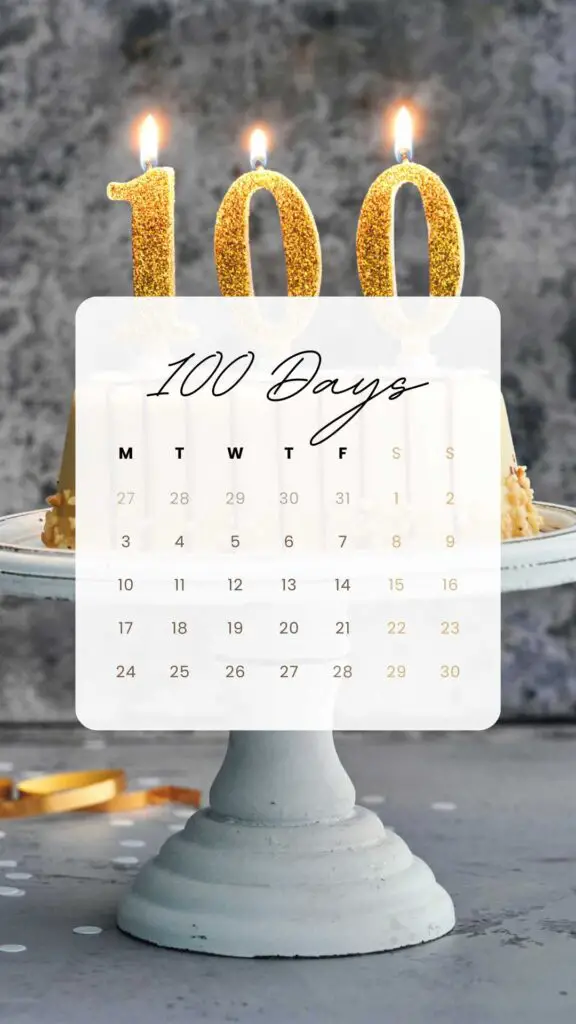
The first birthday celebration Koreans enjoy is called baek-il-janchi, or the Korean 100 day celebration.
Parents and family celebrate the baby’s health one hundred days after a child is born.
This tradition originated in the distant past when infant mortality rates were high, and many babies did not live that long.
Reaching 100 days showed that the child was resilient and would live a long life.
In addition, 100 is a significant number for Koreans, symbolizing wholeness and health.
At 100 days, a baby is considered old enough to “greet” guests. Traditionally, parents will share rice cakes – if possible, 100, to ensure long life.
But times have changed in a way that passing out rice cakes is not so much about the number; rather the symbolic meaning behind celebrating the 100th day.
You can bring gifts to a Korean 100th day baby celebration, especially clothes for the baby. Close family or friends will often give a silver spoon or chopsticks.
In Korean-American families, diapers, cash, or even a cute card are all great gifts.
For example (due to the pandemic), we invited on a very small handful of family members to celebrate our son’s 100th day celebration.
We received a box of diapers, cash and the cutest outfits for our son.
Though the 100 day Korean baby celebration isn’t as big as it once was in history, you can still find Koreans practice these traditions today.
Frankly, I love any opportunity to have a great time with our son.
First Birthday – Doljanchi
Parents hold another party to celebrate the child’s first year: in Western terms, the baby would be a year old, but to Koreans, the baby is now two, although 12 months have passed.
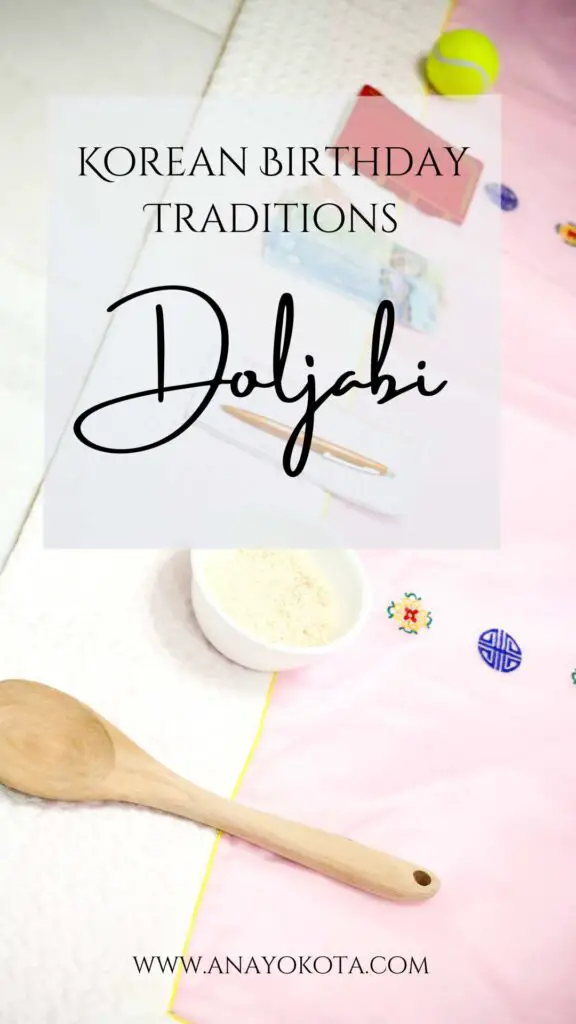
The doljanchi is a milestone celebration where the baby is dressed in the traditional hanbok and hood.
A special custom or fortune-telling game, known as the doljabi, involves predicting the baby’s future.
The parents will set out a series of objects on the table, each with a meaning, which the baby then reaches for. For example:
- If the baby grabs a banknote, they will be rich.
- A spool of thread symbolizes long life.
- A calligraphy brush or book is a sign of the baby’s intelligence.
These objects will differ regionally and from family to family, with modern additions like a microphone for future K-Pop idols or footballs for the next Son Heung-min.
Lots of laughter and excitement ensue as relatives urge the baby to grab different objects.
Traditional foods include plain rice, rice cakes, and seaweed soup (miyeok guk).
Sixtieth Birthday
Just as a baby reaching 100 days is important, a person reaching the age of 60 is celebrated.
This tradition dates back to when life expectancy was shorter, so someone of 60 was considered very old.
The number 60 is auspicious in Korean culture as it signals the end of a lunar cycle, with the sixtieth year being the same as the first year astrologically and hence heralding a rebirth.
The hwangap, or sixtieth birthday celebration, takes place on the date of birth and is enjoyed with family and close friends.
One custom involves those celebrating the birthday (often the parents or grandparents) sitting at a table.
Their children, relatives, and grandchildren approach them in order of age, offering wine and bowing respectfully.
Family members may dress up as young children, referring to the rebirth of the lunar cycle.
Seventieth And Eightieth Korean Birthday Traditions
As life expectancy has increased, Koreans now celebrate the seventieth (chilson) and eightieth (palsun) birthdays with similar respect and joy.
For the sixtieth, seventieth, and eightieth birthdays, the festivities occur on the birthday and often involve lavish banquets.
Guests tend to dress in traditional clothes, and typical food served includes fruit, rice cakes, chicken, beef, and fish.
Nowadays, a birthday cake is also typical.
Wine is an appropriate gift if you’re invited to one of these parties.
New Year’s Day
Koreans calculate your age from New Year’s Day, when everyone becomes a year older:
New Year is thus everyone’s “birthday.” Koreans will hold a party, usually wearing hanboks and serving rice cake soup (tteokguk).
Annual Birthdays
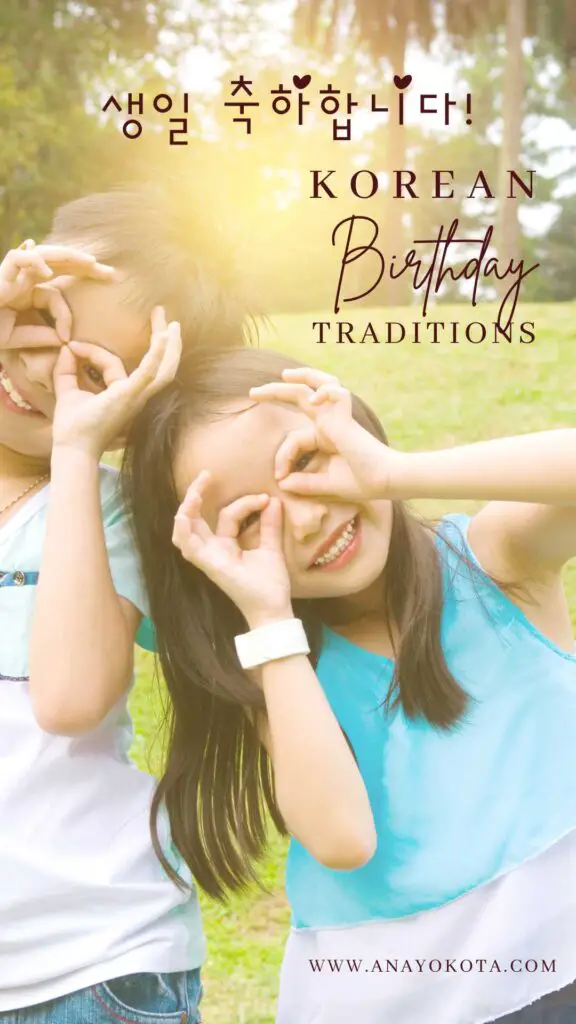
Even though their age doesn’t change on their date of birth according to tradition, Koreans do celebrate their birthdays, often with birthday cakes, candles, the Happy Birthday song, and a party.
Older Koreans might refer to someone’s birthday as “the day the ears popped out,” meaning the day they were born.
This day begins at midnight, so Koreans often stay up to celebrate and wish their friends and family well, just as a New Year celebration counts down to midnight.
If it’s not for a significant birthday, the celebration is often a simple family birthday meal, sharing seaweed soup as a sign of respect and gratitude to the mother:
miyeok guk is a traditional meal for pregnant women and new mothers, full of vitamins and minerals.
Small children may have a party with friends, teenagers may want trendy gifts such as Kpop memorabilia, while adults often go out for a meal, drinks, often soju, and provide a cake.
Don’t be surprised if everyone in the bar joins in with the singing and birthday greetings – remember to share the cake with them.
If you’re a student, you may also have cake thrown at you or get a playful “birthday punch” (a smack, not a tasty beverage).
Birthday cafés are pop-up events where K-pop fans celebrate their favorite idol’s birthday, share cake, and buy and sell souvenirs.
The idol doesn’t usually attend, but the fans enjoy the party nonetheless.
생일 축하합니다!
If you want to wish a friend Korean birthday greetings or sing the Korean birthday song, these parties are a great way to convey your message for health and happiness and wishing them the chance to eat lots of delicious food.
Final Thoughts on the Korean Birthday System
Koreans’ lust for life is evident in their multiple birthday celebrations and fun birthday traditions.
Aside from the parties, it’s vital to consider the age-related customs in Korea and the importance of respect for one’s elders and care for those younger than you.
I hope that these facts on the Korean birthday celebration will help you on your way to your next Korean birthday party.
Have you ever attended a party for any of these birthday milestones?
What other traditions would you like to learn? I always love hearing what my readers what to learn.





